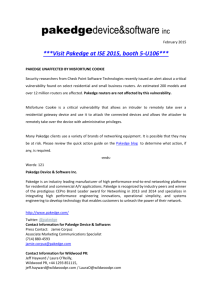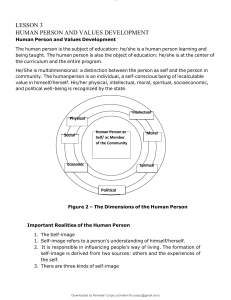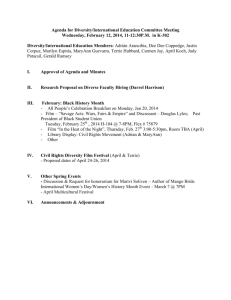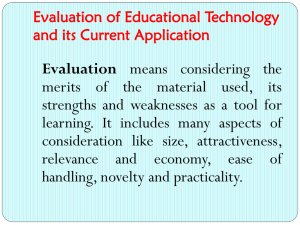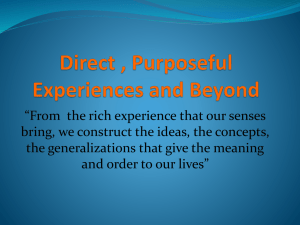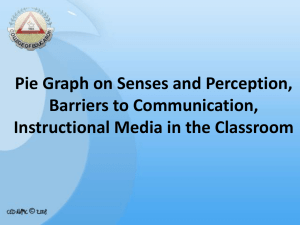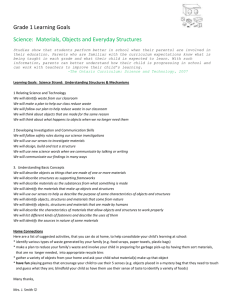Educational Technology: Direct Experiences & Learning
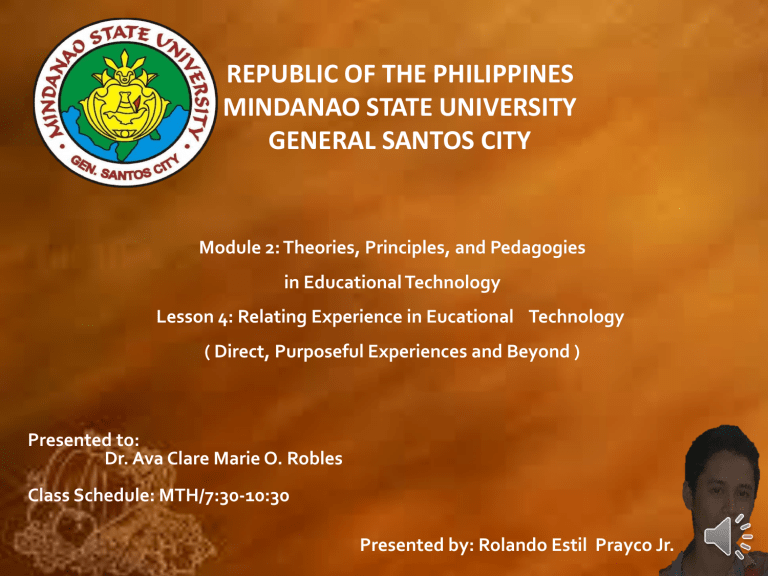
REPUBLIC OF THE PHILIPPINES
MINDANAO STATE UNIVERSITY
GENERAL SANTOS CITY
Module 2: Theories, Principles, and Pedagogies in Educational Technology
Lesson 4: Relating Experience in Eucational Technology
( Direct, Purposeful Experiences and Beyond )
Presented to:
Dr. Ava Clare Marie O. Robles
Class Schedule: MTH/7:30-10:30
Presented by: Rolando Estil Prayco Jr.
Module 2: Theories, Principles, and
Pedagogies in Educational Technology
Lesson 4: Relating Experience in Educational
Technology
“From the rich experiences that our senses bring, we construct the ideas, the concepts, the generalizations that give meaning and order to our lives.”
– Edgar Dale
(Corpuz, Lucido 2012)
BJECTIVES:
Definition of Terms
BJECTIVES:
Definition of Terms
Discuss some testimonies resulted to learning experiences .
BJECTIVES:
Definition of Terms
Discuss some testimonies resulted to learning experiences.
Discuss and understand the given concepts and have the summary/conclusion .
DEFINITION OF TERMS
Direct, Purposeful Experiences
These are our concrete and firsthand experiences that make up the foundation of our learning.
Indirect Experiences
Are experiences of other people that we observe, read or hear about.
(Corpuz, Lucido 2012 )
Dale’s Cone of Experience
Is a visual model, a pictorial device that presents bands of experience arranged according to degree of abstraction and not to degree of difficulty.
(Corpuz, Lucido 2012)
Testimonies:
“The meanings of negative discrimination index and positive discrimination index became crystal clear to me only when we did an item analysis of our test items .”
– Grade VI teacher
(Corpuz, Lucido 2012)
“My husband and children used to do computer job for me which made me totally dependent on them. The problem was they were not always around to help me with my reports, lecture notes, etc. To redeem myself from my helplessness, I forced myself to learn, first of all encoding, then sending e-mail and surfing the internet.
What encouraged me was my five-year old granddaughter could do what I was not capable of doing. Now I feel liberated. I can encode and print my lectures, send emails, surf the Internet, and do powerpoint lecture presentation, even when no one is around to help only
after I had do these things myself.”
– Graduate School Professor
(Corpuz, Lucido 2012)
My boss assigned me to put the transparencies on the plate of the overhead projector while he delivered his lecture on stage. It turned out that the first transparency was not positioned upright for the audience. I repositioned the transparency but it was still inverted.
I felt nervous and the woman in the audience who was seated nearby came to my rescue.
I have never forgotten that experience but having been assigned the task repeatedly, I can say I am now expert at the OHP.
Secretary to the Dean
(Corpuz, Lucido 2012)
“It was only
when I came to Manila zoo
that I learned that a giraffe is that tall and an elephant is that big.”
-
Grade 4 pupil
DISCUSSION:
Whatever skills or concepts we have did not come out of the
blue. We spent hours doing the activity by ourselves in order to aquire the skill. The same thing is true with the previous narrators . They learned the skills by doing. The Graduate School professor had to do the computer task herself to learn the skill. The Grade IV pupil got a crystal clear concept of the size of the elephant and height of the giraffe after seeing with her eyes the real elephant and giraffe.
(Corpuz, Lucido 2012)
Direct, Purposeful Experiences
These are the rich experiences that our senses bring from which we construct the ideas, the concepts, the generalizations that give meaning and order to our lives. (Dale,
1969). They are sensory experiences. (Corpuz, Lucido 2012)
Indirect Experiences
They are not our own self – experiences but still experiences in the sense that we see, read and hear about them. They are not firsthand but rather vicarious or indirect experiences.
(Corpuz, Lucido 2012)
Why are these direct experiences described to be purposeful?
Purposeful because the experiences are not purely mechanical.
They are experiences that are internalized in the sense that these experiences involve the asking of questions that have significance in the life of the person undergoing the direct experience. They are also described as purposeful because these experiences are undergone in relation to a purpose, i.e. learning.
(Corpuz, Lucido 2012)
“Direct, Purposeful Experiences and Beyond”
Implies that these direct experiences must not be the period or the dead end. We must be brought to a higher plane. (Corpuz, Lucido 2012)
How should the Cone be interpreted?
The figure shows what students will be able to do at each level of the Cone (the learning outcomes they will be able to achieve) relative to the type of activity they are doing (reading, hearing, viewing images, etc.). The numerical figures on the left side of the image, what people will generally remember, indicate that practical, hands-on experience in a reallife context will allow students to remember best what they do.
(http://www2.education.ualberta.ca/staff/olenka.Bilash/best%20of%20b ilash/dalescone.html)
Again, it is important to remember that this doesn’t mean reading and listening are not valuable learning experiences, simply that “doing the real thing” can lead to the retention of the largest amount of information. This is in part because those experiences near the bottom of the
Cone, closer to and including real-world experiences, make use of more of our senses; it is believed that the more senses that are used, the greater our ability to learn from and remember an event or experience .
(http://www2.education.ualberta.ca/staff/olenka.Bilash/best%20of%20bilash/d alescone.html)
The Grade IV pupil’s zoo experience of the elephant and giraffe enables him to understand clearly and visualize correctly an elephant and a giraffe upon reading and hearing the words “elephant” and “giraffe”.
(Corpuz, Lucido 2012)
IMPLICATION OF DIRECT EXPERIENCES TO THE
TEACHING-LEARNING PROCESS
1. It gives our students opportunities to learn by doing.
2. It make use of real things as instructional materials for as long as we can.
3. It helps students develop the five senses to the full to heighten their sensitivity to the world.
4. It guides students to draw meaning from their firsthand experiences and elevate their level of thinking.
SIGHT 75%
13%
HEARING
TOUCH
TASTE
SMELL
6 % 3%
APPROXIMATION OF HOW MUCH PERSONS LEARN
THROUGH THE FIVE SENSES
John Dewey (1916) has made this fundamental point instinctly:
An ounce of experience is better than a ton of theory because it is only in experience that any theory has vital and verifiable significance. An experience, a very humble experience, is capable of generating and carrying any amount of theory (or intellectual content), but a theory apart from an experience cannot be definitely grasped as a theory.
John Dewey (1916) has made this fundamental point instinctly:
It tends to become a mere verbal formula, a set of catchwords used to render thinking, or genuine theorizing, unnecessary and impossible.
(Corpuz, Lucido 2012)
SUMMATION:
Direct experiences are firsthand experiences that serve as the foundation of learning. The opposite of experiences are indirect experiences or vicarious experiences.
Direct experiences lead us to concept formation and abstraction. We should not end our lessons knowing only the concrete. We go beyond the concrete by reaching the level of abstract concepts.
(Corpuz, Lucido 2012)
References: http://www2.education.ualberta.ca/staff/olenka.Bilash/best%20of%20bilash/dalesc one.html
Corpuz, Lucido (2012) Educational Technology 1. Quezon City, Metro Manila: Lorimar
Publishing, Inc.
